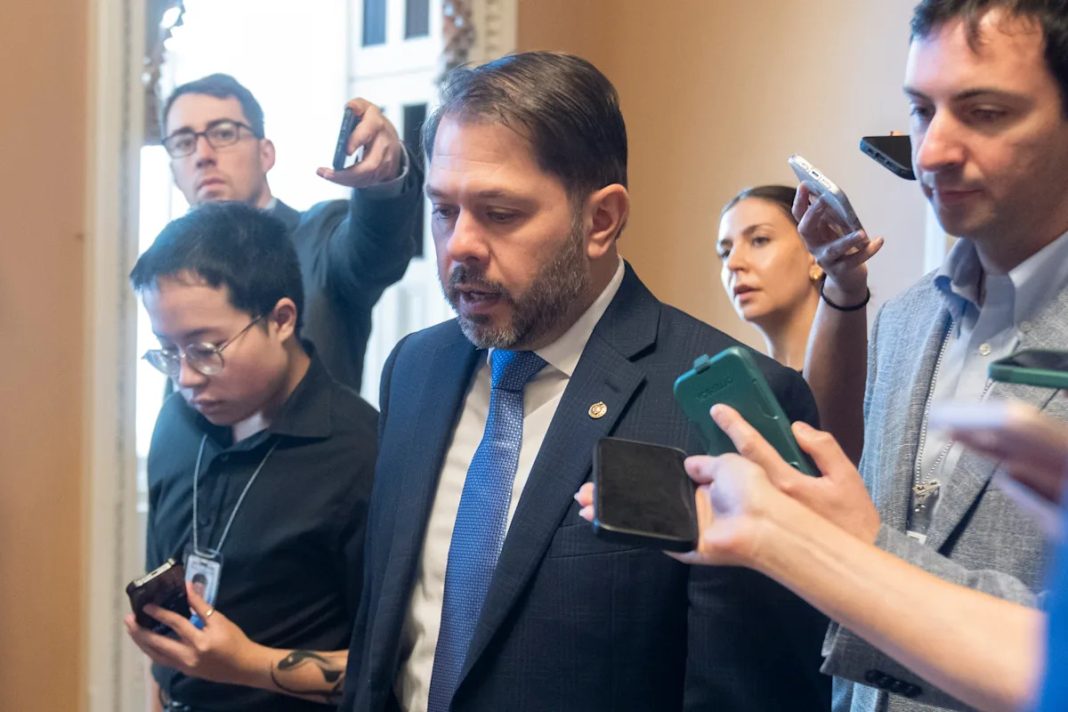A bipartisan group of senators is already looking for a way out of the government shutdown.
The talks, which played out on the Senate floor Wednesday as lawmakers again voted down dueling partisan funding bills, are still in their early stages. Multiple lawmakers involved said they aren’t close to finalizing a proposal.
But the nascent “gang,” as ad hoc bipartisan Senate groups are often called, is the most promising route out of the shutdown in its early hours.
Among the ideas being floated by the members involved are passing a shorter-term stopgap than the seven-week measure passed by the House, as well as possible assurances that Republicans are willing to compromise on extending soon-to-expire health insurance subsidies.
There was lots of “spitballing,” Sen. Ruben Gallego (D-Ariz.), who was part of the floor huddle, told reporters afterward. The goal is to provide some “room” to discuss a “Plan B” that some Democrats are seeking, he added.
Shortening the length of the funding punt could be a hard sell for Republicans, who are skeptical a deal on the insurance subsidies can be quickly notched. The House-passed continuing resolution would expire on Nov. 21, a few days before Thanksgiving.
“I think we’re better off to pass the CR to the 21st and get back to work on appropriations bills,” said Sen. John Hoeven (R-N.D.), shortly after he huddled with Sen. Jeanne Shaheen (D-N.H.) off the floor.
Sen. Mike Rounds (R-S.D.), who is involved in the talks, also said the House timeframe would “suffice” and that there was “nothing wrong with trying to get more work done before” it expires.
Still, senators of both parties hailed the “productive discussion,” as Sen. Tim Kaine (D-Va.) called it, and pledged to keep lines of communication open in the coming days. The Senate is not expected to vote again until Friday, after the Yom Kippur holiday.
Kaine said both Democrats’ health care demand and President Donald Trump’s ability to unilaterally rescind congressionally approved funding came up in the floor chat. Some Democrats want Trump’s power to rescind approved spending curtailed while negotiations play out.
“We’re talking about both, and there are good discussions going on,” Kaine said, adding that senators need a “path” for making health care fixes.
Conversations have been happening quietly among multiple members of the Senate rank-and-file for days as their party leaders remained at loggerheads. Now, with the government shut down for the first time since 2019, they are quickly gaining steam.
The backdrop is an aggressive effort from the Trump administration to pressure congressional Democrats, including threats Wednesday to withhold funding for crucial transportation projects in New York and to proceed with the mass firings of federal workers.
White House budget director Russ Vought told House Republicans on a private call Wednesday that the administration will start those layoffs “in a day or two,” according to four people on the call granted anonymity to describe it.
But there are still major sticking points. Senate Majority Leader John Thune insisted Wednesday that there would be no escape hatch into negotiations so long as the House-passed stopgap remains unpassed. There’s no indication, either, that Speaker Mike Johnson would be willing to sign off on a Senate-brokered deal or advance it through the House.
“People were looking for a way out, but the way out is to open up the government,” Thune told reporters Wednesday.
Democratic leaders immediately touted the bipartisan talks. “We’ve always believed that Democrats and Republicans should sit down to negotiate,” Senate Minority Leader Chuck Schumer told reporters. “It’s a good thing.”
While Republicans insist they will not negotiate on extending the insurance subsidies while the government is shut down, some GOP senators have suggested they could work out a framework for how the “mechanics” of the talks would go once the government is reopened to try to offer more reassurances to Democrats.
Some Republicans are also discussing dealing with the subsidies — enhanced tax credits under the Affordable Care Act that are set to expire Dec. 31 — as part of the larger appropriations process. Some senators want a deal on the issue by Nov. 1, when open enrollment for ACA plans begins, according to Sen. Thom Tillis (R-N.C.), who participated in the floor discussion.
Sen. John Cornyn (R-Texas) said he mostly “listened” in the floor huddle. But he said establishing some sort of framework for an extension of the tax credits — after reopening the government — was “part of what’s being discussed.”
While some Democrats — such as House Minority Leader Hakeem Jeffries — have demanded any ACA extension get written into “ironclad” legislation as part of any deal, several Senate Democrats have been careful not to demand that the matter has to be added into a temporary stopgap.
Beyond passing a shutdown-ending funding punt, senators are also discussing the larger fiscal 2026 funding process, including moving a package of full-year spending bills that have stalled amid the shutdown fight. One idea is pairing Defense Department funding, a top priority for Republicans, with Health and Human Services funding, a top priority for Democrats.

